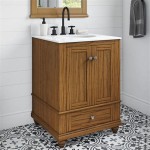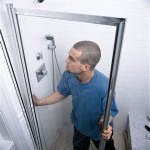What Causes a Sewer Smell in the Bathroom?
An unpleasant sewer smell in the bathroom can be an indication of an underlying issue that requires attention. While the smell itself may not be harmful, it can be a nuisance and a sign of potential problems with the plumbing or ventilation system. Here are some of the common causes of a sewer smell in the bathroom:
1. Dry P-Trap
A P-trap is a U-shaped section of pipe that is installed under sinks, toilets, and other plumbing fixtures. It holds a small amount of water to create a barrier that prevents sewer gases from escaping into the bathroom. If the P-trap becomes dry, due to evaporation or infrequent use of the fixture, it can allow sewer smells to permeate the bathroom.
2. Faulty Wax Ring
A wax ring is a seal that is placed between the toilet base and the waste pipe on the floor. Over time, the wax ring can deteriorate or become misaligned, which can create a gap where sewer gases can escape. This is a common cause of sewer smells around toilets.
3. Clogged Vent Pipe
Vent pipes allow sewer gases to escape from the plumbing system and vent them outside. If the vent pipe becomes clogged, sewer gases can build up in the pipes and eventually escape through drains or fixtures. Clogged vent pipes can be caused by debris, ice buildup, or even bird nests.
4. Broken or Cracked Pipes
Cracks or leaks in sewer pipes can allow sewer gases to escape into the bathroom. These breaks can occur due to age, corrosion, or damage from tree roots. If you suspect a broken or cracked pipe, it's important to contact a plumber immediately.
5. Inadequate Ventilation
Proper ventilation is crucial for preventing sewer smells in the bathroom. Bathrooms should have an exhaust fan or window that allows fresh air to circulate and remove moisture. Insufficient ventilation can lead to the accumulation of sewer gases and other unpleasant odors.
6. Overgrown Trees
Tree roots can sometimes grow into sewer pipes and cause blockages or damage. If a tree is planted too close to a sewer line, its roots may eventually penetrate the pipes and create openings for sewer gases to escape.
7. Bacterial Buildup
Bacteria can accumulate in drains and pipes over time, producing foul odors. This is especially common in drains that are rarely used or are not cleaned regularly. To prevent bacterial buildup, it's important to clean drains and fixtures regularly using a drain cleaner or vinegar solution.
Preventing Sewer Smells in the Bathroom
To prevent sewer smells in the bathroom, it's important to address the underlying causes and take preventive measures. Here are some tips:
- Run water through drains and fixtures regularly to prevent P-traps from drying out.
- Inspect and replace wax rings around toilets periodically.
- Keep vent pipes clear of debris and obstructions.
- Repair or replace broken or cracked pipes promptly.
- Ensure adequate ventilation in the bathroom by using an exhaust fan or opening windows.
- Avoid planting trees too close to sewer lines.
- Clean drains and fixtures regularly to prevent bacterial buildup.

What Causes A Sewer Smell In The Bathroom Make It Right
My Bathroom Smells Bad But Only When Its Hot Outside It Also Will Slightly Go Away I Run The Sink And Toilet Bathtub Any Thoughts On What Is

Why Is There A Sewer Odor In My Bathroom Ben Franklin Bay Area

Sewer Smell In Bathroom How To Identify And Fix The Problem

Why Does My Toilet Smell Like Sewage 5 Causes Solutions
What To Do When You Notice A Sewer Smell In Bathroom Spaces Howstuffworks

How To Get Rid Of Sewage Smell In Your Bathroom Bond Cleaning Adelaide

Finding A Sewer Odor In Your Bathroom

Why Does My Bathroom Smell Like Sewage Metro Flow Plumbing

How To Eliminate Basement Odor And Sewer Smells Family Handyman







